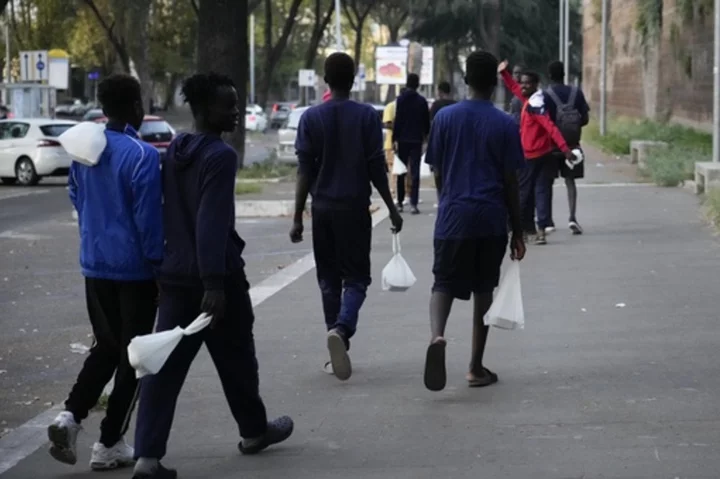ROME (AP) — A flotilla of flimsy boats, crowded with migrants and launched from Tunisia, overwhelmed a tiny southern Italian island on Wednesday, taxing the coast guard's capability to intercept the smugglers' vessels and testing Premier Giorgia Meloni's pledge to thwart irregular migration.
Compounding the political pressure on Italy's first post-war far-right leader were vows by France and Germany to rebuff migrants who arrive by sea on Italian shores, and, in defiance of European Union asylum system rules, head northward to try to find jobs or relatives.
Starting early Tuesday, the unseaworthy, overcrowded iron boats, came one after the other in what appeared to be almost a procession to onlookers on Lampedusa, a fishing and tourist island south of Sicily. Around 6,800 migrants came in a span of just over 24 hours — that number is a few hundred higher than the isle's full-time population.
With Lampedusa-based Italian coast guard and border patrol boat unable to intercept all of the smugglers' boats offshore, dozens of migrants temporarily eluded authorities by climbing up Lampedusa’s rocky shores on their own.
When the coast guard tried to assist one boat early Wednesday, the smugglers' vessel tipped over, and a mother with her five-month-old baby fell into the sea, Italian Rai state TV said, reporting from Lampedusa. The woman, who is from Guinea, was rescued, in shock, but the baby died, Rai said.
Provoking the increase in numbers was a bottleneck in Tunisia's ports caused by rough seas that meant the smugglers hadn't been able to launch their boats for days, according to Italian authorities.
With the island's sole migrant residence having a capacity of about 450 beds, authorities scrambled to transfer the migrants via commercial ferries or coast guard vessels or planes to Sicily or in Calabria in the southern toes of the Italian mainland.
"Our aim is to transfer them as fast as possible,'' said Filippo Romano, the prefect of Agrigento, the province in Sicily which includes Lampedusa. He noted that on some days last month, more than 4,000 migrants stepped ashore, and authorities were able to transfer the people elsewhere, where their asylum requests can be initially processed.
According to the Interior Ministry, by early Wednesday morning, nearly 124,000 migrants have reached Italy by sea this year, roughly double the number by that time last year.
Italy saw the highest-ever number of sea arrivals in 2016, when some 181,400 migrants arrived, according to figures from the U.N. migration agency.
Meloni made stopping the arrivals a main plank of her successful campaign to win office almost a year ago.
While she initially advocated a naval blockade of northern Africa's Mediterranean shores to foil smugglers, once in office, Meloni shifted her focus to seeking deals with countries, notably Tunisia, where most of the boats are launched lately, to clamp down on migrant departures.
In June, Meloni joined European Commission President Ursula von der Leyen in a visit to Tunisia, holding out the promise of more than 1 billion euros ($1.1 billion) in financial aid to rescue its teetering economy and better police its borders, in an effort to restore stability to the North African country — and to stem migration to European shores.
On Wednesday, von der Leyen said that the EU's determination to manage migration “needs endurance and patient work with key partners” and spoke proudly of the Tunisia partnership.
In a speech to the European Parliament, von der Leyen also spoke of the need for unity within the EU on migration.
But solidarity seemed to be fraying.
On Tuesday, French Interior Minister Gerald Darmanin visited the town of Menton to announce tough new measures, from policing to technological means like drones, aimed at stopping migrants from making their way from Italy to France. The presence of police and gendarmes will be doubled, 70 police reservists will be added, along with soldiers from the Sentinelle force that combs French cities against terror attacks.
Darmanin is sponsoring an immigration bill that appears to be aimed at responding to pressure from French right and far-right forces demanding get-tough policies on immigration.
In Berlin on Wednesday, an interior ministry spokesman, Maximilian Kall, said that Italy, as well as other EU states, aren't taking back asylum-seekers who made it to Germany, but who, under EU rules, are the responsibility of the first EU country where they set foot.
“Out of more than 12,400 takeover requests to Italy this year until the end of August, 10 transfers have taken place so far,'' Kall said, saying that's why Germany is temporarily suspending acceptance of asylum-seekers under a ”voluntary solidarity mechanism."
Meloni made no immediate comment about the increase in arrivals on Lampedusa, or the moves by France and Germany.
But opposition lawmakers in Italy did. It's Meloni's fault that "Italy today is isolated in Europe. Berlin and Paris are slamming the door in our face on immigration,'' said Sen. Dolores Bevilacqua, with the populist 5-Star Movement.
Meanwhile, once on land, many migrants head to border points with France, Switzerland or Austria, in hopes of reaching the United Kingdom, the Netherlands, Germany or Scandinavia countries.
"They are really in need of food, medicine and shoes, clothes,'' Andrea Costa, head of Baobab Experience, a migrant assistance group, told The Associated Press at the way-station in Rome that the group runs.
___
Trisha Thomas and Nicole Winfield in Rome, Elaine Ganley in Paris, Pietro De Cristofaro in Berlin, and Lorne Cooke in Brussels, contributed to this report.
___
Follow AP’s coverage of global migration at https://apnews.com/hub/migration

